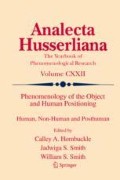Abstract
In this contribution I propose a contemporary reading of the ontological dimension of Max Scheler’s early phenomenology of sense perception. My examination will start with a brief informal explanation of this theory, and his scientific and philosophical sources. The second step will be the introduction of some elements of Formal Philosophy (FP): this piece of research will focus on N. B. Cocchiarella’s interpretation of FP and it will allow me to introduce the concept of a Philosophical Formal Ontology (PFO) in comparison with the computational one (CO). Finally, the third step will be the construction of a semi-formalized model of Scheler’s early phenomenology of sense perception. Here I will use a dynamic-epistemic version of the modal calculus KT5.
Access this chapter
Tax calculation will be finalised at checkout
Purchases are for personal use only
Notes
- 1.
- 2.
In spite of the fact that in the Formalismus Scheler refers to Erkenntis und Arbeit as a soon-to-be-published book (1916, 153), the book’s first draft is datable only between 1923 and 1925.
- 3.
These modifications presuppose a deep rethinking of ontological categories and scientific data and mainly concern the interpretation of the concepts of “corporal thing” (Koerperding) and “perceptual form” (Form) (Scheler, 1979).
References
Avé-Lallemant, E. (1975). Afterword. Bio-bibliographischer Anhang. In P. Good (Ed.), Max Scheler im Gegenwartgeschehen der Philosophie (pp. 267–284). Bern-München: Francke Verlag.
Bergson, H. (1896). Matière et mémoire. Paris: Alcan.
Bosio, F. (2000). Filosofia e scienza della natura nel pensiero di Max Scheler. Padova: IlPolignafo.
Cocchiarella, N. B. (2001). Logica e Ontologia. In Science, theology and the ontological question. Rome: Pontifical Lateran University. (Trans. of F. Marcacci. Logic and ontology. Axiomathes 12: 117–150).
Cocchiarella, N. B. (2007). Formal ontology and conceptual realism. Dordrecht: Springer.
Cusinato, G. (1986/1987). Intuizione e Percezione. Bergson nella prospettiva di Scheler. Annali di Discipline Filosofiche dell’Università di Bologna, 8, 117–145.
Gruber, T. R. (1993). A translation approach to portable ontology specifications. Knowledge Acquisition, 5(2), 199–220.
Guarino, N., Oberle, D., & Staab, S. (2009). What is an ontology? In S. Staab & R. Studer (Eds.), Handbook of ontologies (pp. 1–17). Berlin: Springer.
Hartmann, W. (1963). Max Scheler. Bibliographie. Stuttgart-Bad Cannstatt: Frommann.
Hendricks, V., & Symons, J. (2005). Formal Philosophy. Copenhagen: Automatic Press.
Properzi, M. (2014). Il linguaggio religioso è traducibile in uno analitico? In C. Canullo (Ed.), Differenze e relazioni (Vol. 3). Roma: Aracne Editrice.
Properzi, M. (2018a). Il giovane Scheler e l’epistemologia. Dialegesthai, 20, https://mondodomani.org/dialegesthai/mpr01.html.
Properzi, M. (2018b). Materia e Forma nella prima estetica fenomenologica di Max Scheler. Rivista internazionale di filosofia e psicologia, 9(2), 162–177.
Rueting, T. (2004). History and significance of Jakob von Uexküll and of his institute in Hamburg. Sign Systems Studies, 32(1/2), 35–71.
Scheler, M. (1916). Der Formalismus in der Ethik und die materiale Wertethik. Neuer Versuch der Grundlegung eines etichen Personalismus. Halle: Niemayer.
Scheler, M. (1955). Die idole der Selbsterkenntnis. In M. Scheler (Ed.), Gesammelte Werke (Vol. 3, pp. 213–292). Bern-München: Francke Verlag.
Scheler, M. (1960). Erkenntnis und Arbeit. Eine Studie über Wert und Grenzen des pragmatischen Motivs in der Ernenntnis der Welt. In M. Scheler (Ed.), Gesammelte Werke (Vol. 8, pp. 9–423). Bern-München: Francke Verlag.
Scheler, M. (1968). Vom Wesen der Philosophie und die moralischen Bedingungen des philosophischen Erkennens. In M. Scheler (Ed.), Gesammelte Werke (Vol. 5, pp. 61–101). Bern-München: Francke Verlag.
Scheler, M. (1972). Versuche eine Philosophie des Lebens: Nietzsche–Dilthey–Bergson. In M. Scheler (Ed.), Gesammelte Werke (Vol. 3, pp. 311–341). Bern-München: Francke Verlag.
Scheler, M. (1979). Manuskripten zur Metaszienzien. In M. S. Frings (Ed.), Gesammelte Werke (Vol. 9, pp. 125–184). Bern-München: Francke Verlag.
Scheler, M. (1986a). Lehre von den drei Tatsachen. In M. Scheler (Ed.), Gesammelte Werke (Vol. 10, pp. 431–475). Bern-München: Francke Verlag.
Scheler, M. (1986b). Phänomenologie und Erkenntnistheorie. In M. Scheler (Ed.), Gesammelte Werke (Vol. 10, pp. 377–431). Bern-München: Francke Verlag.
Scheler, M. (1993). Biologievorlösung. In M. S. Frings (Ed.), Gesammelte Werke (Vol. 5, pp. 257–367). Bonn: Bouvier.
Studer, R., Benjamins, R., & Fensel, D. (1998). Knowledge engineering: Principles and methods. Data & Knowledge Engineering, 25(1–2), 161–198.
Uexkuell, J. (1928). Theoretische Biologie. Berlin: Springer.
Verducci, D. (1997), La phénoménologie de la vie et la philosophie selon Max Scheler. Analecta Husserliana, 50, 165–180.
Author information
Authors and Affiliations
Corresponding author
Editor information
Editors and Affiliations
Rights and permissions
Copyright information
© 2021 The Author(s), under exclusive license to Springer Nature Switzerland AG
About this chapter
Cite this chapter
Properzi, M. (2021). Phenomenology and Formal Ontology: A Theoretical Model of Max Scheler’s Early Phenomenology of Sense Perception. In: Hornbuckle, C.A., Smith, J.S., Smith, W.S. (eds) Phenomenology of the Object and Human Positioning. Analecta Husserliana, vol 122. Springer, Cham. https://doi.org/10.1007/978-3-030-66437-4_5
Download citation
DOI: https://doi.org/10.1007/978-3-030-66437-4_5
Published:
Publisher Name: Springer, Cham
Print ISBN: 978-3-030-66436-7
Online ISBN: 978-3-030-66437-4
eBook Packages: Religion and PhilosophyPhilosophy and Religion (R0)

